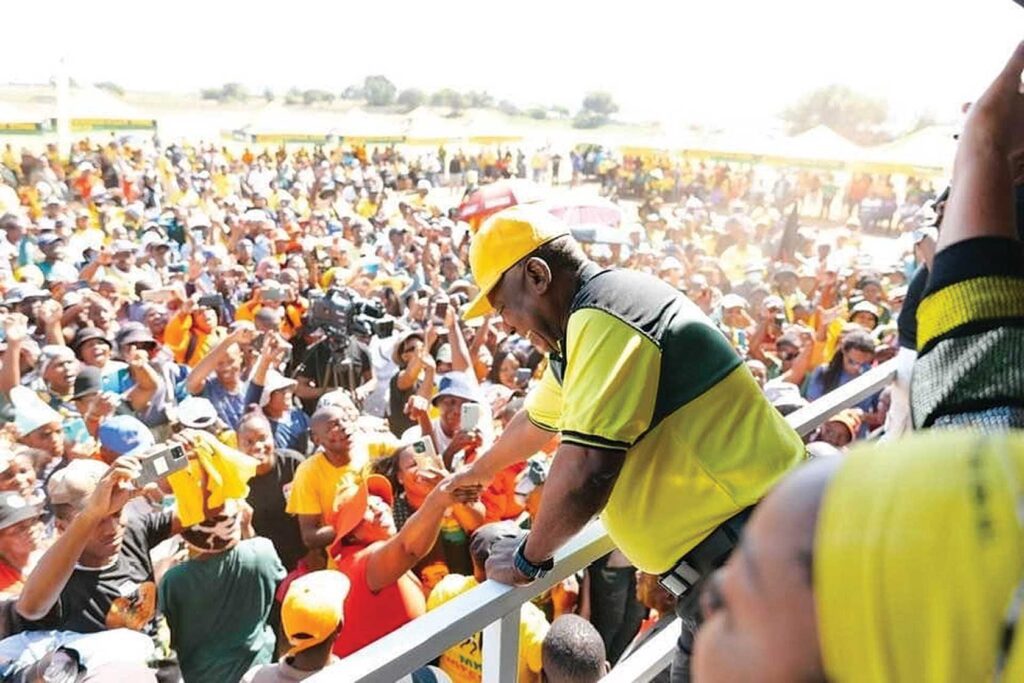South African voters give ANC stunning setback
Talks to form a governing coalition to begin soon

The African National Congress lost its parliamentary majority in a stunning rebuke by South African voters in the May 29th elections, forcing the party of Nelson Mandela to seek a coalition partner for the first time in its electoral history.
Angry over declining state services, corruption, rising crime and high unemployment, the electorate delivered only 40% of the vote to the ANC, which has governed with a robust majority since the first post-apartheid elections in 1994.
With virtually all votes counted as of Sunday, the ANC had won 40% -— an 18-point slide from their 2019 result. The centrist-right Democratic Alliance (DA) finished second at 22%. A new party, the upstart uMkhonto weSizwe (MK), formed by ousted former President Jacob Zuma, won 14%. The far-left Economic Freedom Fighters (EFF) finished with just under 10%.
With 159 seats in the 400-seat parliament, the ANC must form a coalition and share power to reach a 201-seat majority in the national assembly. Once seated, the parliament will select the young democracy’s president.
President Cyril Ramaphosa, elected after longtime ANC leader Zuma was ousted after a 2018 corruption scandal sent him briefly to jail, is eligible to serve a second and final five-year term.
ANC’s slide in last week’s closely watched May 29 balloting, contested by 52 parties, forced the humbled leader into urging all electoral factions to find “common ground” and move forward together.
“Our people have spoken,” said Ramaphosa in a national address. “Whether we like it or not, they have spoken. We have heard the voices of the people and we must respect their choices and their wishes.”
When voters in the country of 62 million lined up to cast ballots last week, the heady days of ANC freedom fighter Nelson Mandela leading jubilant rallies in cities and townships across South Africa 30 years ago were a distant memory.
To many younger voters – the “Born Frees” raised after the fall of white minority rule – the constant electricity blackouts and lack of job prospects mattered more than the storied history of the governing party and its once-imprisoned leaders. Among the 80% Black majority in the country, many voters who abandoned the ANC and its faltering promises of economic and social equity rallied to Zuma’s new party.
The rapid ascent of MK was especially evident in Zuma’s home base of KwaZulu-Natal Province in the country’s east, where ANC support dropped 34 points from its 2019 finish, plummeting from 54% to 17%.
Facing the challenge of forming a new government within two weeks of the vote, the ANC must find a way forward with chief rivals who denounced it as corrupt during months of brutal campaigning. Since the votes were counted, all have expressed a willingness to work with the ANC.
The Democratic Alliance’s market-based views on economic development align with ANC policies but the DA, viewed broadly as the moderate, business-friendly successor to white rule, attacked the governing party during the election season as part of a “doomsday” cabal leading the country to ruin. It is also opposed to any race-based laws designed to apportion jobs and wealth more evenly in the continent’s most developed economy.
John Steenhuisen, a white Afrikaaner who serves as the DA party leader, said he was open to coalition talks despite their differences over such issues as the ANC’s pro-Russia and pro-China views and a welfare system supporting 24 million South Africans. “We urge all others who love our constitution, all it represents, to set aside petty politics, narrow sectarian interests and join hands now,” he said in a statement.
In a nation where whites make up 7% of the population, the DA’s stronghold is the Western Cape Province, which includes Cape Town, a renowned tourist attraction and the country’s legislative capital. The DA-dominated provincial assembly governs a region still markedly segregated by race – making a partnership problematic for the ANC.
An alliance with Zuma’s MK would also create a majority but require political fence-mending between bitter foes. Zuma, who was ruled ineligible to take a seat in parliament but is still the face of the party, has made it known that MK would only partner with the ANC if Ramaphosa stepped aside as its head – a demand already rejected by the ANC.
Zuma has also called for a re-run of the election, citing unspecified allegations of vote-rigging. During an address before final vote counting over the weekend, the MK leader said the announcement of voting results should be delayed. “We are going to need the time,” he was quoted as saying in an AP report. “Nobody must declare tomorrow, no. If that happens, people will provoke us because we know what they are doing.”
The Economic Freedom Fighters lost slight ground from their finish in 2019 and relinquished their standing as the third-largest party to MK. EFF leader Julius Malema, who formed the party after being ousted as head of the ANC’s youth league a decade ago, said last week that his demands to potential coalition partners would include redistributing land without compensation within six months.
Political analyst Oscar van Heerden said one likely outcome would see the ANC join hands with the DA but bring in a number of smaller parties to make the partnership more acceptable.
“The next few days is going to be a very difficult period,” he told AP. “People will have to be mature behind closed doors.”






